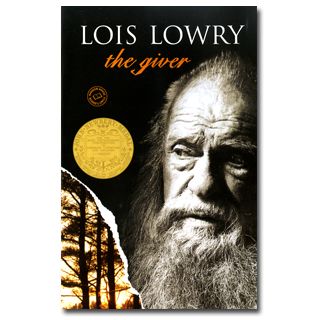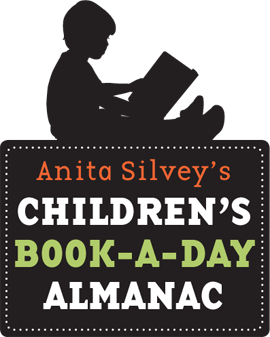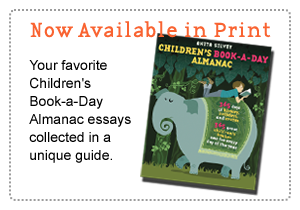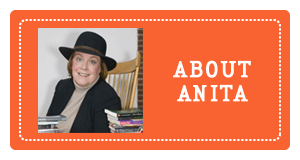
A FEW OTHER EVENTS FOR
DECEMBER 3:
- Happy birthday, Grace Andreacchi (Little Poems for Children).
- It’s also the birth date of Joseph Conrad (1857–1925), Heart of Darkness.
- In 1847, abolitionist movement leader Frederick Douglass publishes first issue of newspaper North Star. Read Frederick Douglas: A Noble Life by David Adler.
- It’s National Roof over Your Head Day, an opportunity to appreciate all that we have starting with shelter that protects us from the elements. Read Let’s Go Home: The Wonderful Things About a House by Cynthia Rylant, illustrated by Wendy Halperin. And today is Take Your Child to a Bookstore Day. I hope all Almanac readers do!
“It was almost December, and Jonas was beginning to be frightened.” With these words Lois Lowry opens the best novel for children of the 1990s and one of the greatest science fiction works of all time—The Giver.
In the early ’90s Lowry found herself a frequent visitor at a nursing home. There her mother, going blind, would relate tales of her life. Although in better physical shape, her father was slowly losing his memory. He would look at pictures of Lois’s sister, now dead, and ask how she was doing.
Then while taking her grandson on a Swan Boat ride in Boston Public Garden, the young boy said to her, “Have you ever noticed that when people think they are manipulating ducks, actually the ducks are manipulating people?” As she thought about this comment, her parents, and her own life, she began to wonder what kind of world the next generation of children would inherit.
In The Giver, Lowry began to write about what she thought was a utopia for those children of the future. This world appears to have solved all problems—poverty, inequality, loneliness, and old age. Children are carefully trained for their future occupation, chosen by the community. Families raise a controlled number of children and follow strict rules. But slowly as Lowry worked on the book, she grew to realize the dark side of this world. One of the most powerful moments of The Giver comes when the reader understands the high price of this system: a small child is killed without emotion or remorse.
The protagonist, twelve-year-old Jonas, has been given his assignment for his future work—to serve as the apprentice for The Giver, who keeps the memories of the community. In the process of receiving these memories, Jonas begins to realize that his community has made certain choices, ones that make him increasingly uncomfortable. A young man of great heart and social conscience, Jonas finally realizes that he can no longer stay; he must flee and try to get himself and his brother Gabe to another community.
One of the greatest strengths of this book, perfect for the classroom or book group, has always been its ambiguous ending. The last line—“But perhaps it was only an echo”—leaves every reader with a slightly difference sense of how the story ends. Although the author herself has always insisted that she provided a happy, optimistic ending, in that sentence she left room for each person to bring their own sensibility and opinions.
Lowry has always had the greatest respect for her audience, believing children capable of understanding complex issues. Hence, she challenged them in The Giver to think about the society presented in the book and their own world. This provocative and haunting book lingers in the memory of all those who pick it up—one of those rare books that changes the way its readers look at reality.
Here’s a section from The Giver:
It was almost December, and Jonas was beginning to be frightened. No. Wrong word, Jonas thought. Frightened meant that deep, sickening feeling of something terrible about to happen. Frightened was the way he had felt a year ago when an unidentified aircraft had overflown the community twice. He had seen it both times. Squinting toward the sky, he had seen the sleek jet, almost a blur at its high speed, go past, and a second later heard the blast of sound that followed. Then, once more time, a moment later, from the opposite direction, the same plane.
Originally posted December 3, 2010. Updated for .






A powerful book and one that draws more controversy with parents than just about any other middle grade novel. Before I read the book, I looked at the cover and thought it to be a Holocaust novel, and after reading it, I still think the cover is wrong for what the book is about.
Thanks for including the evocative opening.
Finally, I had no idea that in the beginning she intended the book to present a utopia. That explains why its all the more shocking when the truth behind the community is revealed.
To start out on one track and slowly discover another side or deeper meaning is every writer’s dream. the background you provide is the reason why that book resonates so strongly with readers. The emotion is organic; the fear is real. Jonas is believable because Lowry was taking the same journey of discovery, and experiencing the same feelings of fear.
Thanks for that explanation, Anita.
This comment is my Holiday card to Anita.
When I was a child, there were few non-school books available to me for the most part. As an adult, I started reading and building a personal library of various books, many of them the classics. Then, I decided I wanted to be an author myself. (Not there yet.)
I began making notes, and over a period of time, I accumulated boxes of writing, title ideas, short stories, etc. (Many of you will recognize the path.)
As I continued to read on further and further, I became interested in children’s books as a possible area to write in. That was completely unexpected.
I began to experiment with my ideas to see what my own childhood would offer up, I had a profound and terrible insight. I had missed children’s books as a child. I felt numb just trying to think about it.
Searching my mind, I became depressed realizing for the first time in my life, that there was an empty place in my reading soul. Children’s books.
What to do? I’m adult now. Will I be able to capture that magic as I once might have?
(The answer turns out to be “Yes!”)
I spent many months at the library and at book stores looking for a way to remedy this emptiness. I looked at recommended lists and books of lists until I was light-headed from it. Then, one day I came across a little book called 100 Best Books for Children. I read the introduction, and started browsing the notes Anita had written about each author and book, as well as discussing the book with a public library children’s book specialist, and suddenly, I knew this book was the tool I was going to use to fill that empty place. It, was the one! And the choice has turned out to be perfection.
It took me about two years to read those (and other) selections. And now I’m pushing on deeper into other books she has recommended.
My whole point of this too-long comment is this: Of the roughly 130 books I read as an adult based on Anita’s book, Messenger by Lois Lowry had the the most shocking profound impact on me I could have ever imagined.. It did that to me, because I knew that boy. I had been that boy in childhood. I made my own kind of escape from a somewhat different and yet idealistically similar situation, and this book inspired, strengthened and encouraged my in new ways. Goodnight Mister Tom, is the only other children’s book that has done that to me.
When first I meet Anita Silvey, and Lois Lowry, if they don’t like being hugged, they had best hide.
What a wonderful, wonderful thing they have done, as have all the other author’s in Anita’s book.
I had absolutely no idea that such books had even been imagined out in the world, let alone written. And so many of them!
Happy Holidays.
G. Perry
Thanks for the comments. Peter the typo has now been fixed.
Years later, I remember the look on a student’s face when she came to school the morning after I had put The Giver in her hands: absolute astonishment. It’s a breathtaking book.
I’m in graduate school now, and I still have my copy of “The Giver” from the fourth grade. I re-read it at least once a year, and every time I notice some new aspect of the story. The idea of a cult that sets up a world within a world, a place where extremes have been realized, has never felt impossible. In many ways, the society of “The Giver” is one where all my worst nightmares have been realized, which makes it all the more frightening and believable. I love your comment about the ending being left open to interpretation. For me at least, the ending has always been hopeful. I think that’s one of the reasons this book remains one of my favorites: it holds out hope for humanity, even under the most extreme conditions. And who doesn’t need a little hope now and then?
I sort of missed this book and Lowry due to being the wrong age when she started writing but decided to read it when Betsy Bird did her top 100 list a year or so ago. I was touched when my now 7th grade niece proudly offered her copy in return for all the books I had given or lent her. I enjoyed the book and marvel at her ending – few authors would have had the nerve to go for such abiguity.
I can’t imagine a worthier book for the Almanac’s birthday.
Thanks for this bit of background on one my favorite books. Even though Lois Lowry came to my OZ Children’s Bookstore in Southwest Harbor, Maine, shortly after “The Giver” was published and we talked a lot, I hadn’t heard this before.
Sheila
The first time I read this book was in college, actually. And I love the complexity and maturity of topics it deals with. I also appreciate the risk Lowry took in publishing this book even though some thought she shouldn’t. It just goes to show that sometimes you just have to follow your convictions as a writer, because you never know where they might lead you. I know so many people love this book, and it’s definitely one I would recommend to a friend.
I consider this book a great work all by itself. Although it has sequels, I prefer to read it as a stand alone. It needs no further clarification. Whatever you do, absolutely read The Giver!
In grade school I did a project on this book where I dressed up as the Giver for the presentation. I also always thought the ending optimistic-there was mention of grandparents and Christmas trees! What could be more symbolic of hope?
Every page is as extraordinary as the first time I read it. It never fades.
I consider it to be ranked with Good Night Mr. Tom as the most reread children’s book in the several hundred I have read.
Happy Holidays Lady Anita!